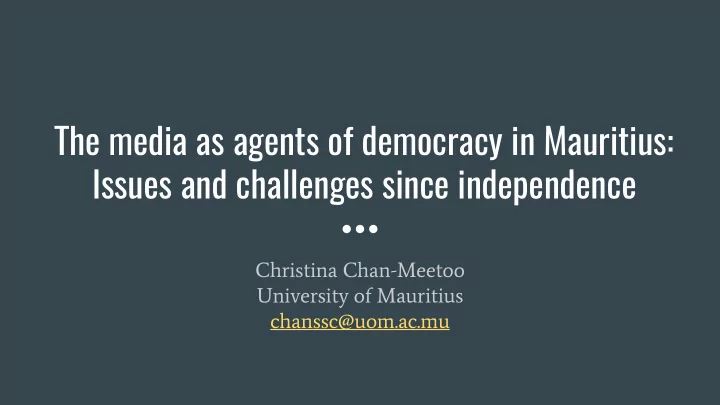

The media as agents of democracy in Mauritius: Issues and challenges since independence Christina Chan-Meetoo University of Mauritius chanssc@uom.ac.mu
Did you know? Oldest paper in Southern hemisphere and on the African continent: Annonces, Affiches, et Avis Divers (1773)
Very brief timeline Multiplicity of media titles over the years after independence: Cernéen, ● Advance, Le Mauricien, La Sentinelle, L’express, 5-Plus Dimanche, Défi Plus.... + many medium-size and smaller players Public radio since 1927 - Private radio since 2002 ● Public TV since 1965 - No private TV! ● Like elsewhere, big changes since 2010s with new media players
Media as “agents” of democracy The People Media Political representatives / State Economic agents ...
Media in the political system Key role in public sphere to channel information to and from citizens Myth of objective, unbiased conduit / forum: Agenda setting ● Gatekeepers ● ● Ideological stance Economic imperatives ● No better alternative yet though...
Media as “agents” of democracy The People Media Political representatives / State Economic agents ...
Media and Politics Journalism is political
Media and Politics Media as Fourth Estate 1970s: State censorship ● 1984: Newspaper and Periodicals (Amendment) Bill ● ● 1994: Creation of Media Trust 2005-2015: Paralysis of Media Trust ● 2013: Robertson’s preliminary report ● 2017: Parliament TV ● Several sporadic onslaughts on media: boycotts, burning of newspapers, interrogations, lawsuits (Dhooharika), temporary banning from National Assembly... Yet, overall, the media in Mauritius are perceived as free and independent.
Media as “agents” of democracy The People Media Political representatives / State Economic agents ...
Media and economic agents Corporate stronghold ● Links/dependency on corporate world with legacy of sugar industry Ownership structures: families, shareholders from big corporations, media barons ● Advertising as key source of revenue = patronage ●
Media as “agents” of democracy Political representatives / State Media Economic agents The People
Media and the people (also known as the audience) Media awareness and literacy. Consider the overall ecosystem. ● Is it diverse enough? Taken together, is there sufficiently broad coverage? ● Are ideological stances clear? ● Are affinities (economic and political) clear to audiences? ● ● Do audiences understand the basic rules of engagement? “Nous vendons du temps de cerveau humain à Coca-Cola”
Constraints Merging / consolidation leading to hegemonic tendencies ● Fragmentation of audiences ● =================================================== Patronage journalism ● ● “He said/she said” journalism + copycat reporting Entertainment/infotainment ● Rise of sensationalism/voyeurism ● Little serious long haul investigation ● ● Pursuit of likes and shares through social media and fad apps Native advertising ●
Constraints (ctd) Political affiliation/affinities, the communicating vase (newsrooms/PR) ● Legal and regulatory constraints ● ○ Official Secrets Act Public service management manual - chilling effect ○ ○ Reliance on internal officious sources Lack of professional standards /absence of a unified ethical framework ● No self-regulation (Morgan and Robertson) ○ Short-lived associations or unions: AJM, USEP, NEPA ○
Constraints (ctd) High turnover rate ● “he says, she says” journalism ○ simplistic reporting ○ desk and phone journalism ○ Difficulty to collaborate ● Little to no induction ● Ego wars ●
Still, good ranking Relatively free despite constraints and weak framework ● No arrests, no physical aggression, no deaths ● ● Diverse players Love-hate relationship with political figures
Opportunities/Challenges ● Fragmentation of audiences / social media / G/F/T ● Flurry of new entrants: pure players and bloggers thanks to cheaper tech and online media ● Audience participation (though policed and moderated) and co-creation - the “people formerly known as the audience” ● The “Paul Lismore” phenomenon
Final words Fundamentals still in dire need of consolidation Solidarity in profession Clear self-regulation and accountability Serious innovation and not just clickbait journalism Need of firewall between editorial and advertising departments
Recommend
More recommend